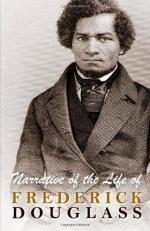There were no beds given the slaves, unless one coarse blanket be considered such, and none but the men and women had these. This, however, is not considered a very great privation. They find less difficulty from the want of beds, than from the want of time to sleep; for when their day’s work in the field is done, the most of them having their washing, mending, and cooking to do, and having few or none of the ordinary facilities for doing either of these, very many of their sleeping hours are consumed in preparing for the field the coming day; and when this is done, old and young, male and female, married and single, drop down side by side, on one common bed,—the cold, damp floor,—each covering himself or herself with their miserable blankets; and here they sleep till they are summoned to the field by the driver’s horn. At the sound of this, all must rise, and be off to the field. There must be no halting; every one must be at his or her post; and woe betides them who hear not this morning summons to the field; for if they are not awakened by the sense of hearing, they are by the sense of feeling: no age nor sex finds any favor. Mr. Severe, the overseer, used to stand by the door of the quarter, armed with a large hickory stick and heavy cowskin, ready to whip any one who was so unfortunate as not to hear, or, from any other cause, was prevented from being ready to start for the field at the sound of the horn.
Mr. Severe was rightly named: he was a cruel man. I have seen him whip a woman, causing the blood to run half an hour at the time; and this, too, in the midst of her crying children, pleading for their mother’s release. He seemed to take pleasure in manifesting his fiendish barbarity. Added to his cruelty, he was a profane swearer. It was enough to chill the blood and stiffen the hair of an ordinary man to hear him talk. Scarce a sentence escaped him but that was commenced or concluded by some horrid oath. The field was the place to witness his cruelty and profanity. His presence made it both the field of blood and of blasphemy. From the rising till the going down of the sun, he was cursing, raving, cutting, and slashing among the slaves of the field, in the most frightful manner. His career was short. He died very soon after I went to Colonel Lloyd’s; and he died as he lived, uttering, with his dying groans, bitter curses and horrid oaths. His death was regarded by the slaves as the result of a merciful providence.
Mr. Severe’s place was filled by a Mr. Hopkins. He was a very different man. He was less cruel, less profane, and made less noise, than Mr. Severe. His course was characterized by no extraordinary demonstrations of cruelty. He whipped, but seemed to take no pleasure in it. He was called by the slaves a good overseer.




